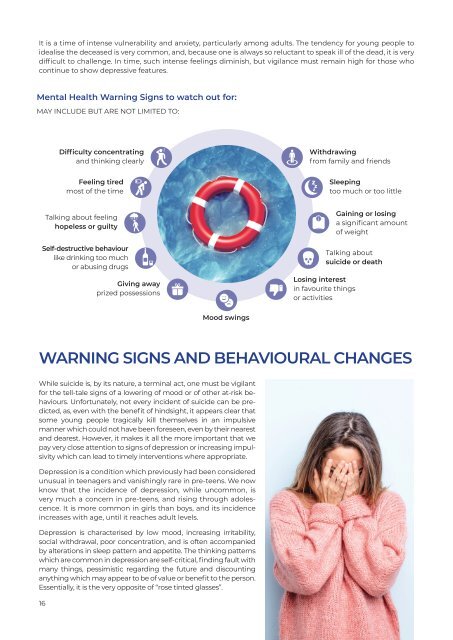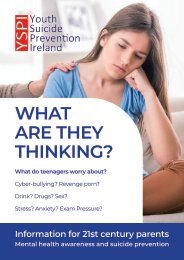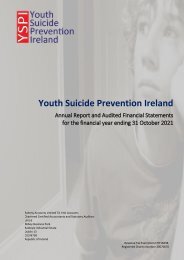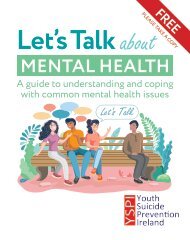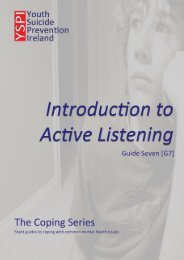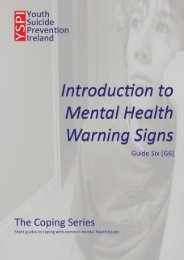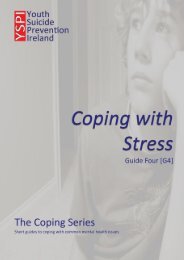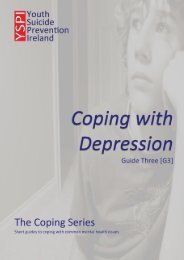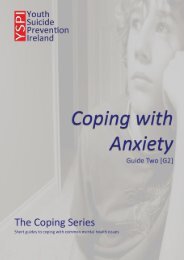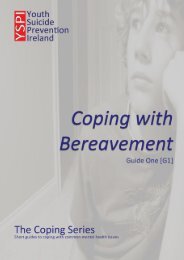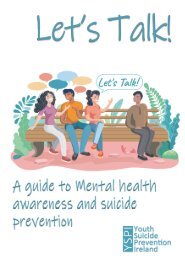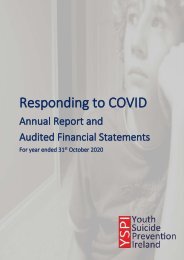Guidance and Information for Teachers and Lecturers
Teachers' guide to youth mental health and suicide prevention, now in it's 10th edition. Topics covered in this guide include: * Introduction to youth mental health awareness * Awareness of mental health risk factors * Recognising the symptoms of mental health issues * Helping someone with mental health issues * Understanding the dangers: Cyber-bullying Online Dangers Locked-away Syndrome * Supporting and developing coping strategies * Warnings signs of suicidal thoughts * Suicide Prevention and intervention * How to help and get help * Child Protection Policies
Teachers' guide to youth mental health and suicide prevention, now in it's 10th edition.
Topics covered in this guide include:
* Introduction to youth mental health awareness
* Awareness of mental health risk factors
* Recognising the symptoms of mental health issues
* Helping someone with mental health issues
* Understanding the dangers:
Cyber-bullying
Online Dangers
Locked-away Syndrome
* Supporting and developing coping strategies
* Warnings signs of suicidal thoughts
* Suicide Prevention and intervention
* How to help and get help
* Child Protection Policies
- No tags were found...
You also want an ePaper? Increase the reach of your titles
YUMPU automatically turns print PDFs into web optimized ePapers that Google loves.
It is a time of intense vulnerability <strong>and</strong> anxiety, particularly among adults. The tendency <strong>for</strong> young people to<br />
idealise the deceased is very common, <strong>and</strong>, because one is always so reluctant to speak ill of the dead, it is very<br />
difficult to challenge. In time, such intense feelings diminish, but vigilance must remain high <strong>for</strong> those who<br />
continue to show depressive features.<br />
Mental Health Warning Signs to watch out <strong>for</strong>:<br />
MAY INCLUDE BUT ARE NOT LIMITED TO:<br />
Difficulty concentrating<br />
<strong>and</strong> thinking clearly<br />
Withdrawing<br />
from family <strong>and</strong> friends<br />
Feeling tired<br />
most of the time<br />
Sleeping<br />
too much or too little<br />
Talking about feeling<br />
hopeless or guilty<br />
Self-destructive behaviour<br />
like drinking too much<br />
or abusing drugs<br />
Giving away<br />
prized possessions<br />
Gaining or losing<br />
a significant amount<br />
of weight<br />
Talking about<br />
suicide or death<br />
Losing interest<br />
in favourite things<br />
or activities<br />
Mood swings<br />
WARNING SIGNS AND BEHAVIOURAL CHANGES<br />
While suicide is, by its nature, a terminal act, one must be vigilant<br />
<strong>for</strong> the tell-tale signs of a lowering of mood or of other at-risk behaviours.<br />
Un<strong>for</strong>tunately, not every incident of suicide can be predicted,<br />
as, even with the benefit of hindsight, it appears clear that<br />
some young people tragically kill themselves in an impulsive<br />
manner which could not have been <strong>for</strong>eseen, even by their nearest<br />
<strong>and</strong> dearest. However, it makes it all the more important that we<br />
pay very close attention to signs of depression or increasing impulsivity<br />
which can lead to timely interventions where appropriate.<br />
Depression is a condition which previously had been considered<br />
unusual in teenagers <strong>and</strong> vanishingly rare in pre-teens. We now<br />
know that the incidence of depression, while uncommon, is<br />
very much a concern in pre-teens, <strong>and</strong> rising through adolescence.<br />
It is more common in girls than boys, <strong>and</strong> its incidence<br />
increases with age, until it reaches adult levels.<br />
Depression is characterised by low mood, increasing irritability,<br />
social withdrawal, poor concentration, <strong>and</strong> is often accompanied<br />
by alterations in sleep pattern <strong>and</strong> appetite. The thinking patterns<br />
which are common in depression are self-critical, finding fault with<br />
many things, pessimistic regarding the future <strong>and</strong> discounting<br />
anything which may appear to be of value or benefit to the person.<br />
Essentially, it is the very opposite of “rose tinted glasses”.<br />
16


